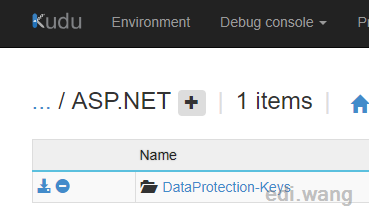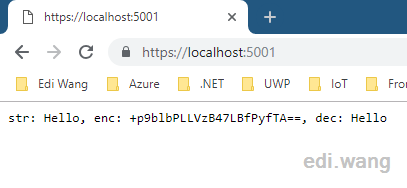ASP.NET Core provides a built-in Data Protection mechanism to let us encrypt or decrypt sensitive data. There are some limitations that can cause problems while bringing convenience. I met some problems these days.
My Scenario
My blog system has a feature to send email notifications, so you need to configure an email account to let the program use that account to send mail to an administrator or users. This involves the question of how to securely store your account password. As programmers with morals, we certainly can't store plaintext passwords to databases like many platforms in China. In this scenario, we also can't store passwords with HASH, because sending messages is done by the system in the background, and the user is not required to enter a password to compare the HASH with the database stored values. Therefore, my first thought is to use the symmetric encryption algorithm such as AES, store the encrypted ciphertext in the database, the program decrypts the values according to key, and then use the account to send mail.
Don't Reinvent the Wheel
Before designing a feature, I usually check the internet first to see if there is already a framework feature that comes with the functionality to complete the requirements. As a result, ASP.NET Core's own Data Protection APIs is brought to my attention.
- The benefits of using Data Protection APIs are:
- Replacement for the classic MachineKey
- No need to design an encryption algorithm on your own, just use the most secured framework provided algorithms.
- Without having to manage the key yourself, the framework will automatically store and manage the key for you.
- The key is refreshed every 90 days by default
- API is easy to use without requiring to know deep about encryptions
- Retain flexibility and extensibility, allowing steps such as custom algorithms, key storage, and more
You can check the detailed introduction on Microsoft Docs here.
The algorithm used by Data Protection is by default AES, which can meet my needs.
Encryption and Decryption Flow
After the framework helps us hide the complex algorithm process, we can complete the encryption and decryption with just 3 simple API calls:

A common practice is: Add DataProtection in Startup
public void ConfigureServices(IServiceCollection services)
{
services.AddDataProtection();
// ...
}Create a service like this to use in other parts of the system
public class EncryptionService
{
private readonly IDataProtectionProvider _dataProtectionProvider;
private const string Key = "cxz92k13md8f981hu6y7alkc";
public EncryptionService(IDataProtectionProvider dataProtectionProvider)
{
_dataProtectionProvider = dataProtectionProvider;
}
public string Encrypt(string input)
{
var protector = _dataProtectionProvider.CreateProtector(Key);
return protector.Protect(input);
}
public string Decrypt(string cipherText)
{
var protector = _dataProtectionProvider.CreateProtector(Key);
return protector.Unprotect(cipherText);
}
}I used this method to encrypt the email account password and store it in the database. Then change the code to successfully decrypt the data, run on my own machine and complete the function of sending mail without a problem. So I deployed it to production.
Production Blow Up!
An exception occurred in the production environment while decrypted the ciphertext in the database:
System.Security.Cryptography.CryptographicException: The key {bd424a84-5faa-4b97-8cd9-6bea01f052cd} was not found in the key ring.
After research, this is because ASP.NET Core generates different keys to encrypt data when it is running on different machines, and the ciphertext in my database is encrypted with the key of the developer machine, not the key of the server. So when you try to decrypt, you can't find the key for encryption, and this exception blows up the server sky high.
ASP.NET Core can store Key to Windows Registry, IIS User Profile, Azure KeyVault, Azure Storage Account or File System, etc. In Azure App Service, the Key is stored in %HOME%\ASP.NET\DataProtection-Keys folder, it will automatically sync into other instances in your App Service. You can see the folder with Kudu:

Therefore, to solve the problem of key inconsistency in different environments, only need to find a consistent storage location. But that's not going to solve my problem. Because by default, a new key is regenerated every 90 days, so that the ciphertext in the database will fail to decrypt again if it is not updated.
In addition, the AntiForgeryToken in ASP.NET Core is also using the same Data Protection APIs, which in case when you deploy multiple web servers on your own (not using App Service to scale out), it will result in different keys in every server, and the user will fail on submitting form data.
The Solution
Although we can do this by saving the key in a unified location, we can also specify an automatic refresh cycle, but I do not recommend it. Because this mechanism applies only to encrypted, short-aging data, it is not designed for data that is persisted into the database. So in this scenario, we still have to write our own service of encryption and decryption.
First (very faceless) copy a pair of AES encryption and decryption functions from Microsoft's official documents:
Encryption
private static byte[] EncryptStringToBytes_Aes(string plainText, byte[] key, byte[] iv)
{
if (plainText == null || plainText.Length <= 0)
throw new ArgumentNullException(nameof(plainText));
if (key == null || key.Length <= 0)
throw new ArgumentNullException(nameof(key));
if (iv == null || iv.Length <= 0)
throw new ArgumentNullException(nameof(iv));
byte[] encrypted;
using (var aesAlg = Aes.Create())
{
aesAlg.Key = key;
aesAlg.IV = iv;
var encryptor = aesAlg.CreateEncryptor(aesAlg.Key, aesAlg.IV);
using (var msEncrypt = new MemoryStream())
{
using (var csEncrypt = new CryptoStream(msEncrypt, encryptor, CryptoStreamMode.Write))
{
using (var swEncrypt = new StreamWriter(csEncrypt))
{
swEncrypt.Write(plainText);
}
encrypted = msEncrypt.ToArray();
}
}
}
return encrypted;
}Decryption
private static string DecryptStringFromBytes_Aes(byte[] cipherText, byte[] key, byte[] iv)
{
if (cipherText == null || cipherText.Length <= 0)
throw new ArgumentNullException(nameof(cipherText));
if (key == null || key.Length <= 0)
throw new ArgumentNullException(nameof(key));
if (iv == null || iv.Length <= 0)
throw new ArgumentNullException(nameof(iv));
string plaintext;
using (var aesAlg = Aes.Create())
{
aesAlg.Key = key;
aesAlg.IV = iv;
var decryptor = aesAlg.CreateDecryptor(aesAlg.Key, aesAlg.IV);
using (var msDecrypt = new MemoryStream(cipherText))
{
using (var csDecrypt = new CryptoStream(msDecrypt, decryptor, CryptoStreamMode.Read))
{
using (var srDecrypt = new StreamReader(csDecrypt))
{
plaintext = srDecrypt.ReadToEnd();
}
}
}
}
return plaintext;
}
Create an EncryptionService
public class EncryptionService
{
private readonly KeyInfo _keyInfo;
public EncryptionService(KeyInfo keyInfo = null)
{
_keyInfo = keyInfo;
}
public string Encrypt(string input)
{
var enc = EncryptStringToBytes_Aes(input, _keyInfo.Key, _keyInfo.Iv);
return Convert.ToBase64String(enc);
}
public string Decrypt(string cipherText)
{
var cipherBytes = Convert.FromBase64String(cipherText);
return DecryptStringFromBytes_Aes(cipherBytes, _keyInfo.Key, _keyInfo.Iv);
}
// EncryptStringToBytes_Aes and DecryptStringFromBytes_Aes above ...
}
KeyInfo is designed as a separate class to flexibly allow the user to choose to assign byte[] array or a string type Key as well as an initial vector (IV)
public class KeyInfo
{
public byte[] Key { get; }
public byte[] Iv { get; }
public string KeyString => Convert.ToBase64String(Key);
public string IVString => Convert.ToBase64String(Iv);
public KeyInfo()
{
using (var myAes = Aes.Create())
{
Key = myAes.Key;
Iv = myAes.IV;
}
}
public KeyInfo(string key, string iv)
{
Key = Convert.FromBase64String(key);
Iv = Convert.FromBase64String(iv);
}
public KeyInfo(byte[] key, byte[] iv)
{
Key = key;
Iv = iv;
}
}Register into DI container
services.AddTransient(ec => new EncryptionService(new KeyInfo("45BLO2yoJkvBwz99kBEMlNkxvL40vUSGaqr/WBu3+Vg=", "Ou3fn+I9SVicGWMLkFEgZQ==")));The key and IV can be obtained by KeyInfo's parameterless constructor. After saving these values, you can always use this pair of key, to ensure that the subsequent encryption and decryption data are consistent.
Usage
private readonly EncryptionService _encryptionService;
public HomeController(EncryptionService encryptionService)
{
_encryptionService = encryptionService;
}
public IActionResult Index()
{
var str = "Hello";
var enc = _encryptionService.Encrypt(str);
var dec = _encryptionService.Decrypt(enc);
return Content($"str: {str}, enc: {enc}, dec: {dec}");
}
Conclusion
ASP.NET Core comes with a Data Encryption API that is secure, easy to use, and flexible. However, that key storage and timed refresh apply only to short-aging encryption. For long-time saved static ciphertext, you can implement an encryption and decryption service on our own.
The complete sample code is on my GitHub: https://github.com/EdiWang/DotNet-Samples/tree/master/AspNet-AES-Non-DPAPI
asozyurt
Thanks for this useful article Edi.It's a good and informative blog, I'm glad to follow. Wanna ask you smt about Rss/Atom feeds.I have a blog in .Net Core too and recently added Rss/Atom support. (http://blog.asozyurt.com/rss) But there is a problem with the prolog Encoding declaration(<xml version="1.0" encoding="utf-16">)Your feed is ok with encoding utf-8. I've solved it by replacing the string but it doesn't seem right to me.Codes are in myGithub. Can you share your solution or guide me? Thanks again.
asozyurt
I think I found, https://github.com/EdiWang/Edi.Blog.OpmlFileWriter. Is it true?
Jeremy
Hi there, your article is very useful but i come to a problem when the encrypted output with character like "+" , which .net doesn't like it if I try to use the value in the URL, .net will throw back 404.11 error to prevent possibility of HTML injection, JavaScript injection or SQL injection. Can you give me some idea how to overcome this problem? Many thanks
German
Hi!
German
Hi! I've been using DataProtection to encrypt data in the database. The shared keys repository solution to sync accross machines worked for me and I didn't encounter the production problem after 90 days. I store the key ring to a UNC drive using PersistKeysToFileSystem.
Whenever the system needs to rotate a key it doesn't actually delete the old key from the key ring, it simply creates a new one at the shared filesystem location and starts using it for encrypting whenever Protect is called. This is automatically handled by the DataProtection system.
At the time of the decryption, the encrypted payload contains a header pointing to the key id in the key ring that was used to protect the data. So as long as you don't delete any keys from the key ring, DataProtection should find the key and you shouldn't have any problems decrypting data from the database.
So basically, never ever delete keys in the key ring for long lived encrypted data.
Thanks for sharing!
Germán
Vlad
Not really helpful neither does it increase the security a lot. In order to decrypt the data, you need the decryption key, which is within your application. So one attacker who gets on your server will have both, the database and the application and can still easily decrypt your data. You should rather use the DataProtection for local or Azure Key Valut for azure applications
Brecht
But that's not going to solve my problem. Because by default, a new key is regenerated every 90 days, so that the ciphertext in the database will fail to decrypt again if it is not updated.
This is true, but the old keys are not deleted from your keystore. Aslong as you don't revoke a key in code or delete it manually from the key store you should always be able to decrypt your data.
Source: https://docs.microsoft.com/en-us/aspnet/core/security/data-protection/implementation/key-management?view=aspnetcore-2.2
They did this because rolling keys are a good practise. If a hacker could decrypt data (by brute-forcing or finding a single key) there is only data decryptable of 90 days in this case.
Martin
Hi very nice article. One question, - How can I generate the keys? And should the have a specific length?
Atle Magnussen
I have to point out some serious misinterpretation about AspNet Core DataProtection.
Atle Magnussen
Sorry my first comment was bit of rubbish. I only need to point out that you can't use Azure Key Vault to store the key ring. https://docs.microsoft.com/en-us/aspnet/core/security/data-protection/implementation/key-storage-providers
You can however use Key Vault's assymetric keys to encrypt the key ring at rest.
And as for your problem, would it not be possible to implement your own custom key provider? See the last headline in the link
David Collins
I have a high level question, and I apologize in advance for my rudimentary knowledge of good encryption practices. I want to use the DataProtection Class for a desktop app to encrypt sensitive data and persist that encrypted data to a file. This then falls under the long-term data storage case you discuss in which I must implement an encryption and decryption service interface interface. So my question is, having encrypted data using this approach, if an attacker has admin privileges, how well-protected is that data in the encrypted file? I know that’s a vague question so let me narrow it down. Assume the attacker knows the general approach used to encrypt the file. I assume they could access the private key I use to decrypt the data and decrypt it themselves. Is that correct? If I used the “User” or “System” key, which are not retrievable, the attacker could simply write code to decrypt the data while logged in as the system or user. Do I have the right mental model here?
Tore
You can indeed store the key ring in Azure Key Vault, I wrote a driver for it here https://github.com/edumentab/AzureKeyVaultKeyRingRepository
Yes, AKV have a few limitations, but for most applications its fine. (blogpost is coming soon)
Hifni
Hi Edi, Thank You for the article. What If I needed the client to encrypt the message and send to me so that I can decrypt it and process the data? AFAIK your article says keys are generated by the Host app (Which in case the Data Protection API) and encrypts the response that goes out from the App to Client. Ideally, a Public Key should be shared with the client so that client can encrypt the request and we, the host can decrypt using a Private key. Can that be accommodated here with Data Protection API?
bigpjo
Great article, nice solution. One thing to be mindful of when talking about cryptography and aes encryption is the reuse of IV. Best practice is to use a new IV for each piece of data encrypted with the same encryption key. The AES crypto provider has a method GenerateIV, this generated IV should be appended/prefixed to the encrypted data. The decryption method can then read the IV from the data to use to decrypt.
If you use the same encryption key with the same iv and the same data the output is the same.